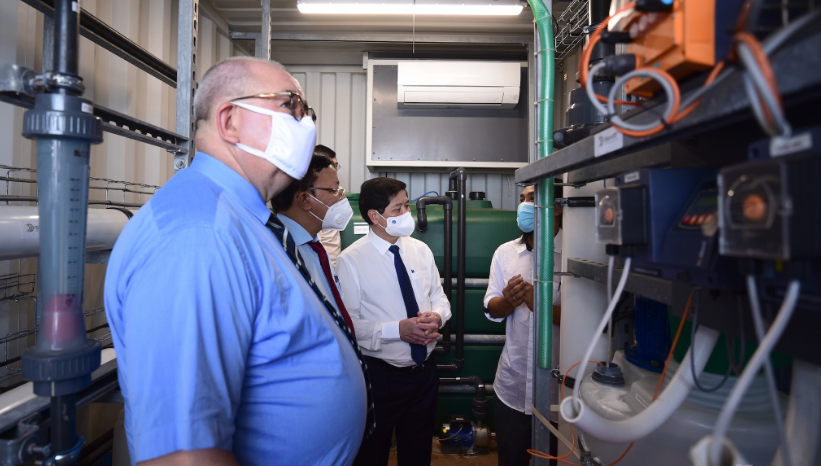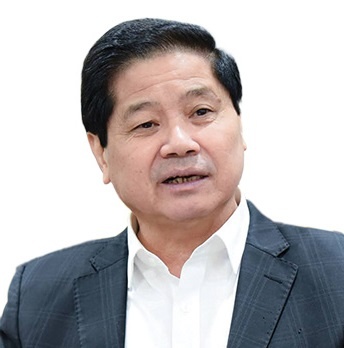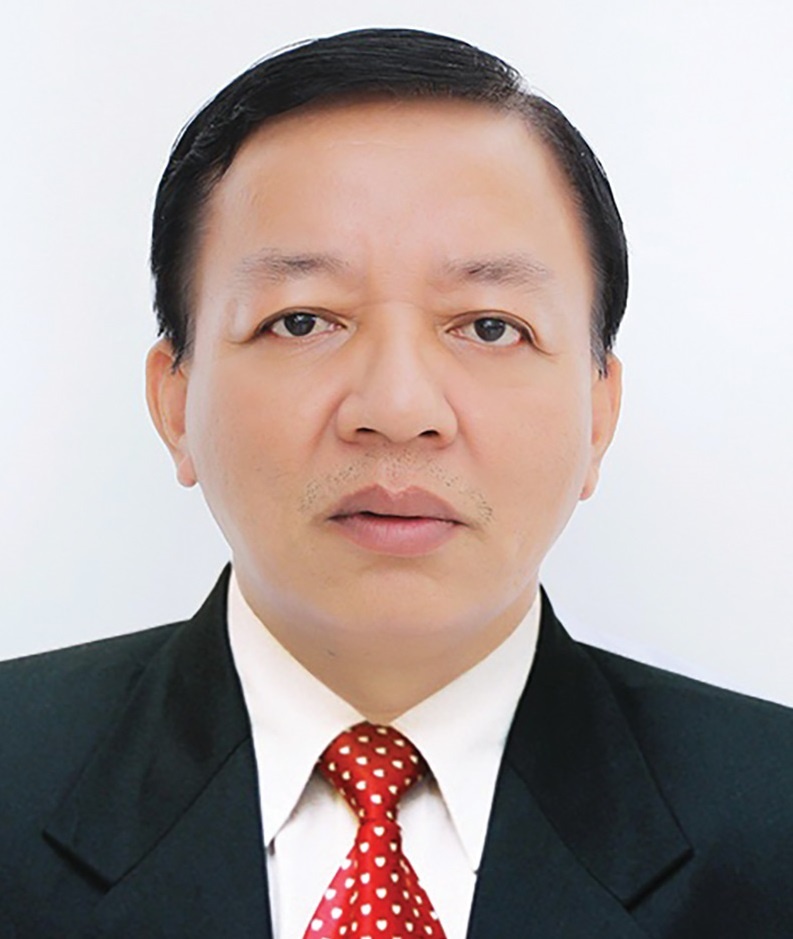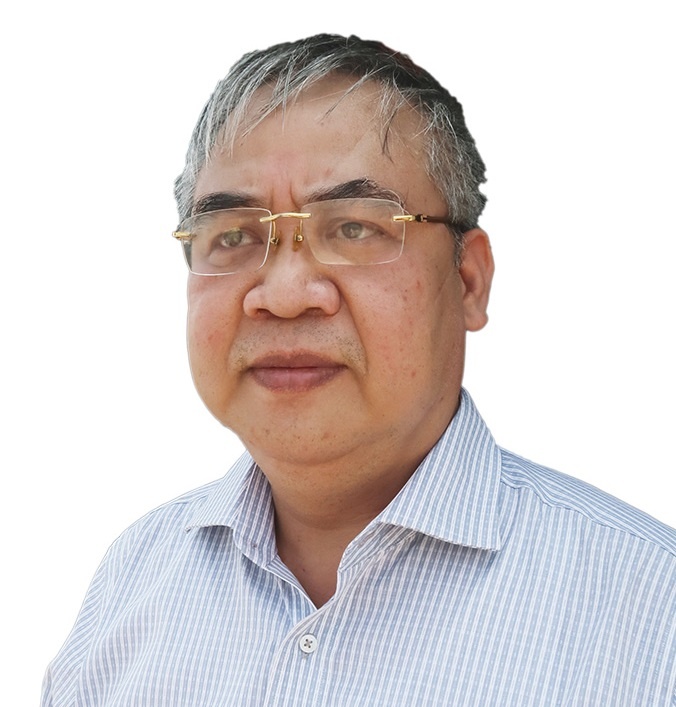Pilot highlights climate solutions
 |
| Deputy Minister of Agriculture and Rural Development Le Quoc Doanh and Belgian Ambassador to Vietnam visit the WbW model, photo vietwater |
In a joint report by the United Nations and two other international organisations on Vietnam’s drought and saltwater intrusion in the Mekong Delta, salinisation is expected to penetrate up to 110km inland in the next few years.
In many locations, the level exceeds the highest figures reported in the 2015-2016 period at the same time of the year. Salinisation and drought exacerbate a variety of socioeconomic issues in the Mekong Delta, including sanitation, food security, education, and health and nutrition, also wreaking havoc on the quality of life and the sustainable development of the region.
In addition, saltwater intrusion causes a shift in occupational structures. According to the General Statistics Office, there was a reversal of the trend of families engaged in fisheries and rice cultivation between 2001 and 2021.
Ninh Thuan is one of the provinces that is most heavily impacted by drought and saltwater intrusion. There is a lack of fresh water in many areas in the province, especially during the dry season, and this seriously affects the daily life and production of local people.
Officially inaugurated on March 15, the ‘water by wind’ demonstration project is a stepping stone towards the goal of proactively responding to climate change by implementing solutions to ensure water sources for production and daily consumption.
Belgian company Smart Universal Logistics (SUL), through sponsorship of the Belgian government, has cooperated with the National Institute of Agricultural Planning and Protection and The Ministry of Agriculture and Rural Development of Vietnam (MARD) to develop the project.
This is Vietnam’s first pilot model of water pumps powered by windmills. It has a daily capacity of 20 square metres, supplying clean water directly to ten impoverished households in Ninh Phuoc district, and a 1000-sq.m test irrigation area.
“The model is the most cost-effective solution for producing freshwater from saltwater. Our team is still continuously working on optimising the setup and the sizing of each component in order to reduce the overall cost and produce more water for farmers,” said Marc Stordiau, CEO of SUL.
Speaking at the inauguration ceremony, Le Quoc Doanh, Deputy Minister of the MARD said, “This pilot project is critical in light of the severe climate change implications that the likes of Belgium and Vietnam have already been suffering.”
Nguyen Hai Minh, who belongs to one of the first 10 households directly benefiting from the pilot said, “Our living conditions and production have suffered from drought and saltwater intrusion during the dry season, which often lasts for half a year. The river water is as salty as seawater and we usually have a shortage of fresh water for daily use and farming.”
According to Minh, the cost of buying fresh water from a factory is a burden for poor families like his. “We feel very lucky to be the first benefactors of the desalination project. We can use the benefits free of charge until the project is completed, and then we are willing to pay the operational fee for continuing to use the water for daily use and farming because the expenditure will still be much more acceptable than usual in the dry season.”
Minh said that they could save VND15-20 million ($650-870) this way. “Hopefully, in the near future, the project will be enlarged so that many more households can benefit from it,” he said.
Within a decade, one in every five homes in the region has converted to a fisheries farm, resulting in a decrease by 15 per cent in the number of households depending on other agriculture. By utilising alternate wind turbine tech, the region’s problem of clean water would be addressed.
“It is also meaningful that the project is implemented in Ninh Thuan province, where Belgian development cooperation has been very active over the past few years, in particular in water management in the context of climate change,” said Belgium Ambassador to Vietnam Paul Jansen.
Over the past 50 years, Vietnam-Belgium cooperation has been promoted in many fields, and 2018 marked an important milestone when the two countries became strategic agricultural partners.
To further promote bilateral cooperation, on the occasion of launching the water-by-wind scheme, Deputy Minister Doanh had an official meeting with Ambassador Jansen to urge the Belgian side to create favourable conditions for the two countries’ agro-forestry-fishery products to penetrate into each other’s markets. Belgium is currently Vietnam’s fifth-largest and most important agro-forestry-fishery trading partner in the EU.
Doanh hoped that Belgium would continue to support the development of waterway logistics and cold storage systems in the Mekong Delta with Belgian technology to connect to a transport network of fresh agricultural and seafood products of this area to Cai Mep Port and to Antwerp Port of Belgium, as well as other major ports in the world. In particular, the deputy minister proposed that Belgium would support Vietnam in developing sustainable agriculture and building quality standards and regulations related to food hygiene and safety.
“Currently these projects are a bit delayed. I hope that the ministry will support many more to speed up these logistics and smart storage projects in the Mekong Delta region to help Vietnamese fruit and vegetables adapt to the EU’s quality standards and make it easier to export to the potential market,” said the ambassador.
Furthermore, Doanh also suggested that the Belgian side should support Vietnam to remove the illegal, unreported, and unregulated yellow card on Vietnamese seafood as well as consult in developing cocoa products so that it can be exported to Belgium and become associated with its famous chocolate brand.
| Le Quoc Doanh - Deputy Minister of Agriculture and Rural Development
Agriculture and rural development have long been central to Vietnam’s socioeconomic development strategy. Through various trade agreements with countries worldwide, most recently with the European Union, Vietnam’s agricultural products are uplifting its position in the international markets. New regulations on agricultural development emphasise the focus on fostering sustainability, ensuring environmental safety, improving farming livelihoods, and maximising the capabilities of localities. The increasing climate change in Vietnam has resulted in clean water scarcity in the Southeast and the Mekong Delta region and severely affected production and the lives of the locals. To mitigate this challenge, the Ministry of Agriculture and Rural Development is prioritising the development of environmentally friendly and cost-effective alternatives to provide clean water. The water-by-wind technology is the result of a joint effort in designing a solution to the issue of clean water in the Mekong Delta and is a critical step in assessing the feasibility of implementing this and thereby replicating it in locations suffering from clean water scarcity. Paul Jansen - Belgian Ambassador to Vietnam
Saltwater intrusion is really a death threat to the Mekong Delta, the biggest centre of agricultural production in Vietnam. Our two countries have already been working on this very serious problem for many years. The Belgium-Vietnam academic cooperation has, for instance, invested a lot and keeps investing in the sustainability of Vietnamese aquaculture, and together with Can Tho University, we are working on projects to adapt aquaculture to more salinised water. The concept of the future version of the plant is initially a Belgian patent, a creation of Tim Maeyens, one of the Belgian engineers of Smart Universal Logistics, who has been working on this project for years, together with Marc Stordiau and Valentijn Maussen. The system put in place is unique and original, due to the automation switch from the grid to windmills and later back from the windmills to the grid. In a way, it is a bit like solar panels installed on the roof of private houses, which are also coupled with the national grid in order to guarantee that electricity is always available and stable. Le Huyen - Deputy Chairman Ninh Thuan People’s Committee
Ninh Thuan is striving to become a national clean energy centre by concentrating on establishing renewable energy infrastructure. The province has numerous prospects for developing renewable, wind energy and solar energy owing to its environment with minimal rain as well as plenty of sunshine and wind. Its natural conditions are also favourable for cultivating high-yield and high-quality crops and livestock that can serve as local specialities. Ninh Thuan is directing its efforts towards the development of a green economy, with a particular focus on renewable and clean energy. On the other hand, the province is confronting numerous difficulties and challenges caused by climate change. Reservoir capacity is dwindling dramatically as a result of a progressive decline in rainfall and an increase in drought. In addition, saltwater intrusion due to the increasing sea level is jeopardising productivity and local livelihoods. I expect this project be a springboard for extensive and direct application of renewable energy in agricultural production in Ninh Thuan and other provinces in the Mekong Delta seriously affected by climate change. Nguyen Quang Dung - Director, National Institute of Agricultural Planning and Projection
The model utilises cutting-edge wind turbines to purify saltwater intrusion that the EU and Belgium have successfully adopted in many countries. We strive to operate the pilot system sustainability throughout its lifecycle. This is the first pilot project so we need some more time to evaluate its efficiency, but its value in high and environmentally-friendly technology is highly appreciated. On that premise, we will conduct comprehensive reviews after the pilot project concludes. In the replication phase, we will make technical adjustments in different regions with the model in order to utilise green energy sources in generating clean water sources, notably in areas plagued by saltwater intrusion and water scarcity for agricultural production and daily usage. For production, clean water will be used to irrigate crops with high economic values. Climate change and salinisation have presented numerous difficulties for locals. At times, drought and saltwater intrusion are severe enough that they are unable to get access to clean water sources for months. So we highly appreciate new practical features to tackle salinity intrusion in the region. |
What the stars mean:
★ Poor ★ ★ Promising ★★★ Good ★★★★ Very good ★★★★★ Exceptional
Related Contents
Latest News
More News
- Vietnam, New Zealand seek level-up in ties (February 19, 2026 | 18:06)
- Untapped potential in relations with Indonesia (February 19, 2026 | 17:56)
- German strengths match Vietnamese aspirations (February 19, 2026 | 17:40)
- Kim Long Motor and AOJ Suzhou enter strategic partnership (February 16, 2026 | 13:27)
- Haiphong welcomes long-term Euro investment (February 16, 2026 | 11:31)
- VIFC in Ho Chi Minh City officially launches (February 12, 2026 | 09:00)
- Norfund invests $4 million in Vietnam plastics recycling (February 11, 2026 | 11:51)
- Marico buys 75 per cent of Vietnam skincare startup Skinetiq (February 10, 2026 | 14:44)
- SCIC general director meets with Oman Investment Authority (February 10, 2026 | 14:14)
- G42 and Vietnamese consortium to build national AI infrastructure (February 09, 2026 | 17:32)





 Tag:
Tag:




















 Mobile Version
Mobile Version